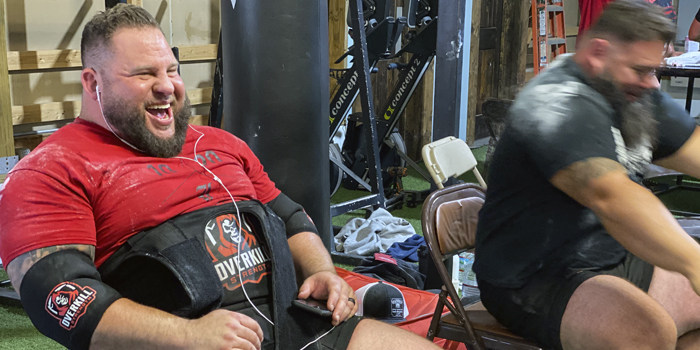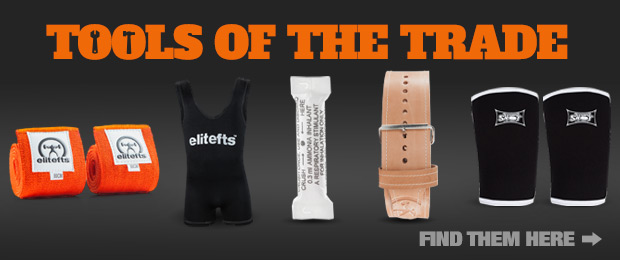
The first article of this series, Strength Athletes, Control Your Variables, covered diet, stress, training partners, and how to train if you plan on competing.
In this article, I will explore some nuances of competing in equipped powerlifting for over 20 years. Raw or equipped, you'll still be able to take something from this. I discuss:
- Gear Fit (Raw and Equipped)
- Gear Sponsorships
- Traveling to a Competition
- Cutting and or Making Weight
In practice, you can master all of these variables. If not, it can ruin an entire training cycle, and you may not make it to the event in time to compete!
Gear Fit (Raw and Equipped)
If you want 50 pounds out of a lifting belt, forgo it in the offseason. When getting heavier, wear the damn thing, and get used to cranking it down and dialing it in.
Make sure you are used to the gear. Know when to tighten or loosen it because you have broken it in. Then, after using it for a complete cycle or two, you know what to expect in this specific piece of gear to boost performance.
LISTEN: Dave Tate's Table Podcast #48 with Brian Carroll
I can tell you pretty much each time I changed gear brands, I bombed—from Titan to Inzer, Inzer to Metal, and from Overkill to Inzer. So, when changing gear, you must expect surprises on game day, even when you have a complete cycle or two.
I suggest finding what equipment you love, breaking it in, dialing it in, and sticking with it. The same goes for your knee wraps. The wrapping style and the type of wrap must be mastered to get the most for your squat.
Gear Sponsorships
They are freaking exhausting! You try to make everyone happy and the only person unhappy is YOU.
The next thing I'll say is disappointing to some and will make others smile: Being sponsored by ONE gear company and expected to make the most out of that gear brand, hit your best lifts, and everyone stays happy is unlikely.
Now, if the equipment is custom, it's a different story. Overkill Strength (and Ginnie Phillips), for example, make everything custom and have a variety of cuts, materials, and styles.
You will need to have your gear altered, sometimes during the precontest phase, so hopefully, you've had enough time in it for the adjustments to be minor. You will need to have it tightened from time to time, but your gear must be broken-in properly.
Most other companies only do off-the-shelf orders, and now most brands don't even do custom cuts for their best powerlifters.
Don't seek a sponsor. Instead, seek the best fit and piece of gear from each brand and worry about your total. Don't worry about the money you'll save from getting gear for free. If the opportunity arises, then you can make the decision.
Most people aren't delighted with their one brand sponsor, no matter what they tell you. With Titan, their bench shirts sucked (16 years ago). I loved the Titan Boss poly suit. Metal's bench shirts sucked for a while, then got much better. Metal's briefs and squat suits were fantastic from the start, just not custom.
Some brands and gear cuts will require you to alter the specific pieces of gear, your training approach, form, and mindset to achieve the most significant lift. I wasted a great deal of time, money, and potential changing gear and thinking the grass was greener with another sponsor.
Traveling to a Competition
Get everything you need without running around ragged before you lift.
In 2006, I had a debacle of a meet trip to Vegas for seniors 06, and I learned valuable lessons. Get to the meet early, not just on competition day but also for weigh-in.
I like to arrive 24 (at the latest) to 72 hours before weigh-in.
Traffic and unforeseen circumstances will always arise when you least expect them.
You need people to help you run errands, get groceries, and locate places to eat near you if you're traveling. Consider the distance to the meet venue and find a sauna or steam room if you have to cut weight, etc. Have plenty of food and drinks for post-weigh-in and the meet day. Keep the type of foods you generally eat the same. During comp week, you should only be worried about your lifting.
Cutting and or Making Weight
Cutting weight is a massive part of being all in, but IMO, only do it if going for an ATWR. One of the biggest regrets is spending too much time restricting calories while trying to be strong.
In my post-2013 meeting with McGill, the caveat is that I couldn't get over 270 without my back feeling stressed. With a back injury, the daily compressive forces matter. My threshold was 269 or so. Therefore, I was again in the 242 weight class for a few years and forced to lift at a light 275 or a big 242.
Most of my time pre-injury, I was obsessed with chasing numbers in lightweight classes. I stayed at 220 for about a year too long and spent nearly four years total at 242 longer than I should have.
Cutting produced fantastic results sometimes, but it also exhausted the process and robbed the fun of lifting for years.
Don't be so obsessed about your weight when you're not making significant money cutting. When you're more worried about making weight than you are about your training and competing, it's time to make a change.
Better than cutting weight, maximize your weight class. Be as healthy and strong as humanly possible, rather than eating and thinking about your body weight like a men's bikini competitor.
Remember, not everyone can simultaneously be aesthetic, jacked, and super strong. Most likely, those are the outliers, and you are not an outlier.
A competitive powerlifter since 1999, Brian Carroll is one of the most accomplished lifters in the history of the sport. Having lifted at the elite world-class level since 2005, Brian has well over a decade of world-class lifting experience. He has totaled more than ten times his body weight in three different classes, and both bench pressed and deadlifted over 800 pounds in two different classes. In his career, he’s totaled 2500 over 20 times in 2 different weight classes. Most recently (10.3.20), Brian set the highest squat of all time (regardless of weight class) with 1306 pounds at a body weight of 303 pounds.











1 Comment